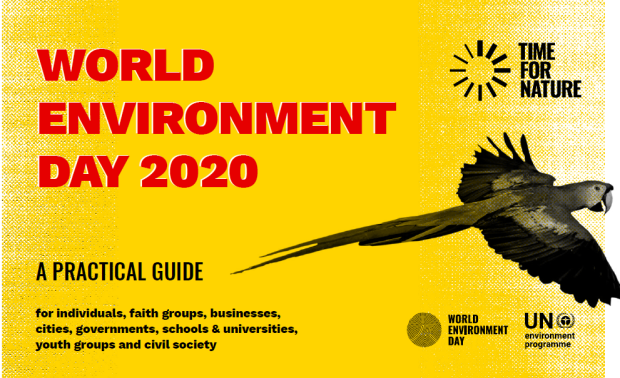World Environment Day 2020 Toolkit - A Practical Guide for participation in the run up to 5 June 2020
Discussion details

This World Environment Day, It’s Time #ForNature.
The theme this World Environment Day, 5 June 2020 is biodiversity - a call to take action to combat the accelerating species loss and degradation of the natural world.
“Biodiversity – the essential variety of life forms on Earth – continues to decline in every region of the world, significantly reducing nature’s capacity to contribute to people’s well-being. This alarming trend endangers economies, livelihoods, food security and the quality of life of people everywhere, according to four landmark science reports written by more than 550 leading experts from over 100 countries.” Intergovernmental Science-Policy Platform on Biodiversity and Ecosystem Services (IPBES, 2019).
According to the latest report by IPBES, one million plant and animal species risk extinction - largerly due to human activities. The five main drivers of biodiversity loss as identified by the latest IPBES and GEO-6 report are: Land-use change, Overexploitation of plants and animals, the Climate emergency, Pollution and Invasive alien species.
The good news is that we can reverse the trends of biodiversity loss by reimagining our relationship with nature and acting now to increase ambition and accountability for its protection. We must conserve and restore wildlife and wild spaces, change the way we produce and consume food, promote environmentally friendly infrastructure and transform economies to become custodians of nature. Hosted by Colombia, in partnership with Germany, World Environment Day urges us to rethink how our economic systems have evolved and the impact they have on the environment.
The world’s response to the COVID-19 pandemic has shown early action and solidarity to tackle pressing issues that threaten our societies. As countries start to plan ways to build back better, getting nature at the heart of all decision making for people and the planet must be our top priority. The COVID-19 pandemic is also a reminder that human health is linked to the planet’s health.
World Environment Day aims to inspire everyone to make their voices heard — citizens need to urge their governments to deliver on their commitments to safeguard nature, end pollution and ensure that environmental laws are upheld. Companies need to develop sustainable supply chains, as well as agricultural and manufacturing practices that do not harm the environment. Citizens and civil society groups should look at how to preserve and restore degraded ecosystems. And consumers should rethink what they buy. With our lives upended, we can unite to find ways not only to live well in harmony with each other but also with nature.
This toolkit provides a practical guide for individuals, faith groups, businesses, cities, governments, schools & universities, youth groups and civil society. It is structured in three parts: learn, share, and act.
- LEARN: learn more about the wild species and habitats with which we share our planet.
- SHARE: In the build-up to World Environment Day (5 June) UNEP will be opening conversation threads across its social media channels. We will be asking you to tell us why it’s time #ForNature. This will be the opportunity for you to share why you love our natural world, for governments to showcase their efforts to protect nature and for organizations to advocate for their cause.
- ACT: Following 5 June and leading up to the fifth UN Environment Assembly in 2021– when the world’s environment ministers will set global priorities – we ask all of you to begin to act on the knowledge you have acquired to help end biodiversity loss and the climate crisis. Only by doing our part can we allow nature to heal and ensure a better and healthier future for everyone.
All you need to participate is a connection to the internet, a book, or even just your imagination.
The World Environment Day website provides latest updates on registration, online events, the agenda and live feeds.
We’d like to ask for your feedback about this guide. Did you find it useful? Would you share it with others? What can we improve? Please contact us at worldenvironmentday@un.org
Thank you from everyone at UNEP.
Log in with your EU Login account to post or comment on the platform.